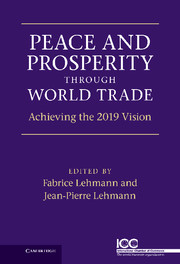Book contents
- Frontmatter
- Contents
- Notes on contributors
- Foreword
- Preface: the ICC vision
- Historical overview and dynamics
- Editorial note
- A Global systemic transformations
- B Governance of global trade
- C Poverty and global inequities
- Editorial introduction
- C1 Trade and poverty: an old debate rekindled
- C2 Trade policy as an instrument of social justice
- C3 Trade, employment and global responsibilities
- C4 Misconceptions about the WTO, trade, development and aid
- C5 Two hundred years after Jefferson
- C6 Trade, coercive forces and national governance
- C7 Gender equality in trade
- C8 Trading health for comfort
- C9 Unlocking entrepreneurial potential
- C10 Trade and security: a vital link to sustainable development in a troubled world
- D The long view on interlocking crises
- E Global business responsibilities
- Conclusion: the imperative of inclusive global growth
- Index
C5 - Two hundred years after Jefferson
Published online by Cambridge University Press: 05 July 2011
- Frontmatter
- Contents
- Notes on contributors
- Foreword
- Preface: the ICC vision
- Historical overview and dynamics
- Editorial note
- A Global systemic transformations
- B Governance of global trade
- C Poverty and global inequities
- Editorial introduction
- C1 Trade and poverty: an old debate rekindled
- C2 Trade policy as an instrument of social justice
- C3 Trade, employment and global responsibilities
- C4 Misconceptions about the WTO, trade, development and aid
- C5 Two hundred years after Jefferson
- C6 Trade, coercive forces and national governance
- C7 Gender equality in trade
- C8 Trading health for comfort
- C9 Unlocking entrepreneurial potential
- C10 Trade and security: a vital link to sustainable development in a troubled world
- D The long view on interlocking crises
- E Global business responsibilities
- Conclusion: the imperative of inclusive global growth
- Index
Summary
In any discussion about international trade, we should remind ourselves of one of Thomas Jefferson's maxims: ‘Commerce with all nations, alliance with none. That should be our motto.’
One of the principal authors of the Declaration of Independence and one of the most influential Founding Fathers of the United States, Jefferson left office as third President two hundred years ago in 1809. Deeply influenced by Adam Smith, Jefferson was a champion of commerce who wanted to promote trade to open markets for US agricultural products, thereby improving farmers' welfare and furthering general prosperity. Although Jefferson was philosophically opposed to such action by the central government, he compromised and purchased the Louisiana Territory from France so that he could promote trade via the port of New Orleans.
During the last two hundred years, trade – especially trade involving goods whose production puts people to work rather than trade based on the extraction and sale of mineral wealth – has been an engine for prosperity, proving Jefferson's wisdom. On a theoretical level, many economists since Smith have articulated the merits of trade. In the early nineteenth century, David Ricardo established that, when two parties engage in trade, both benefit – even if one party is stronger in all areas – as long as each concentrates on its respective strengths.
- Type
- Chapter
- Information
- Peace and Prosperity through World TradeAchieving the 2019 Vision, pp. 149 - 152Publisher: Cambridge University PressPrint publication year: 2010



